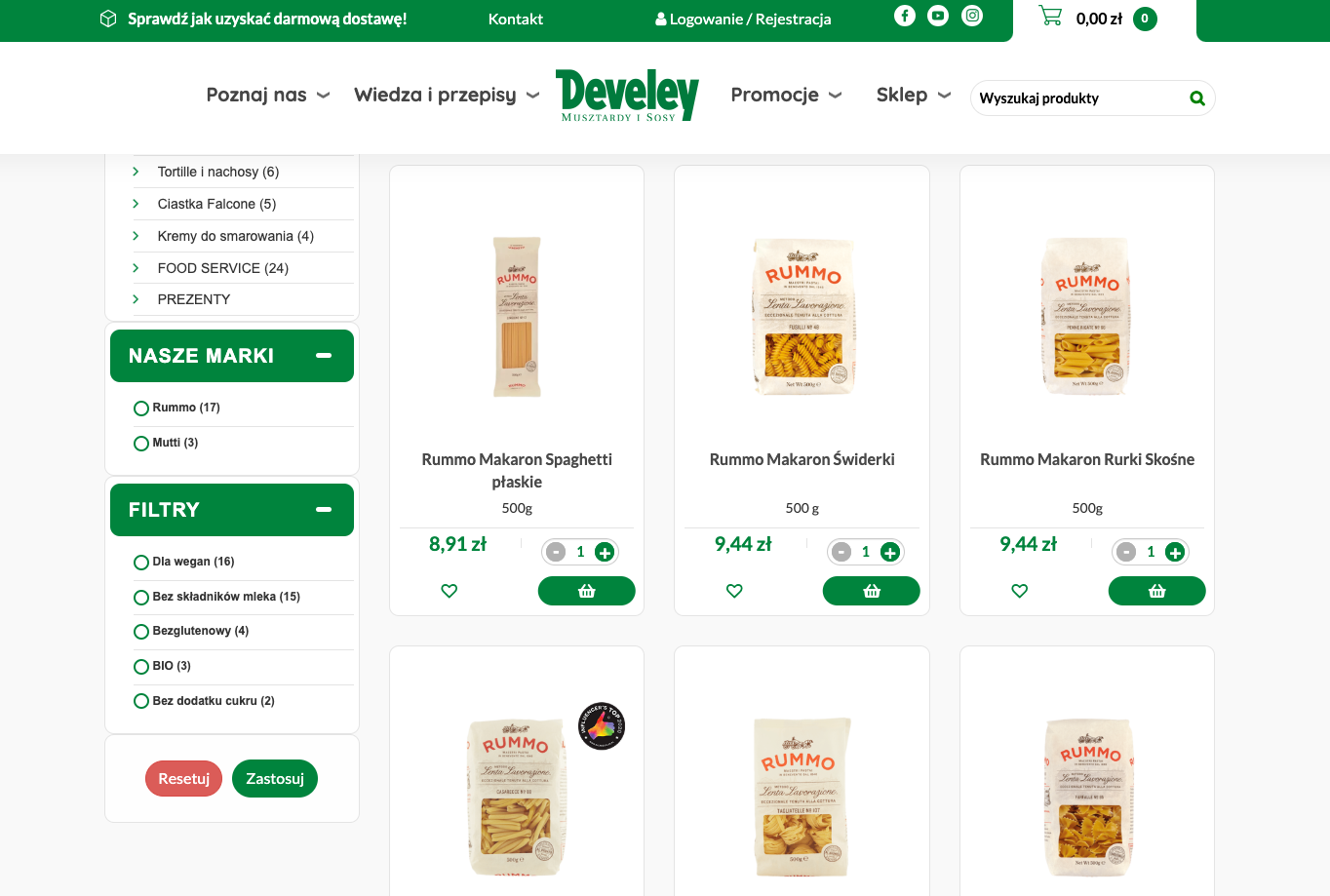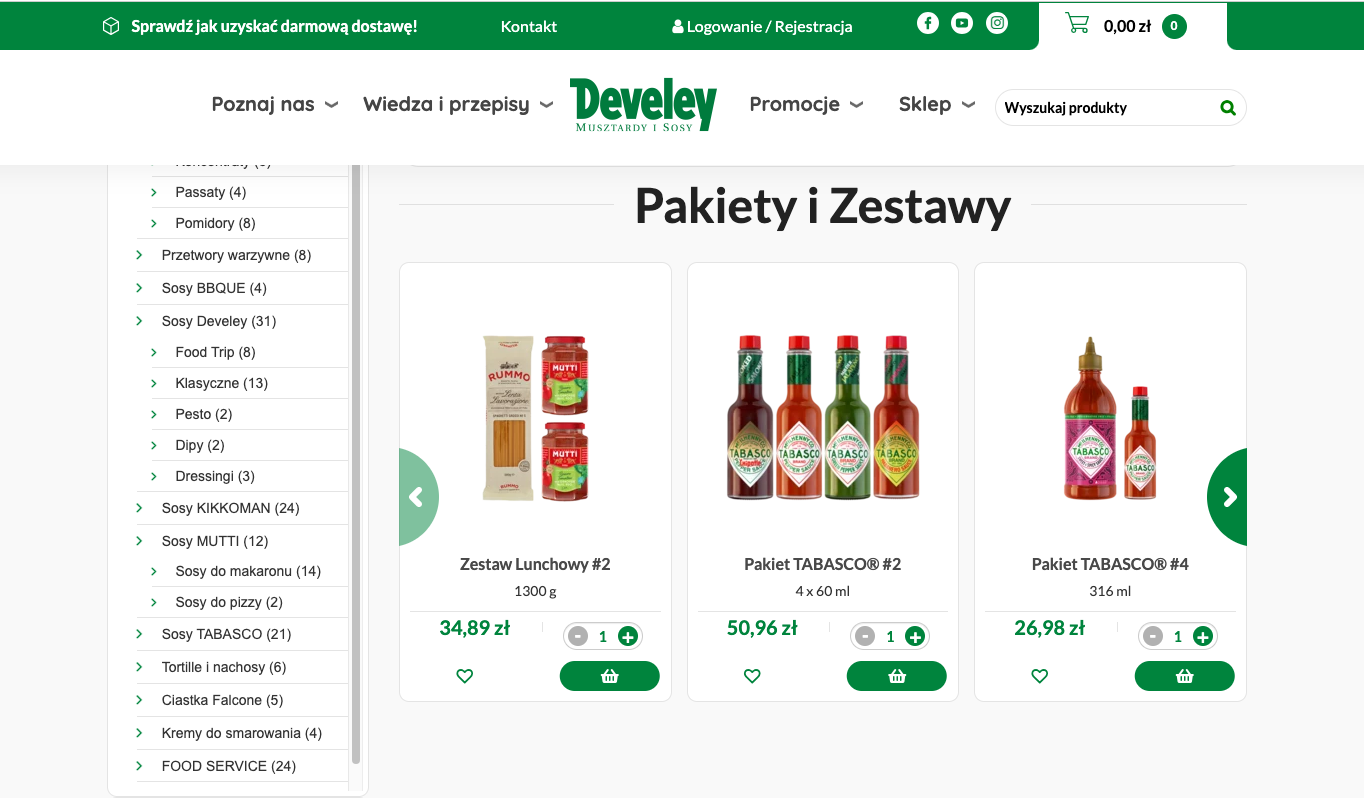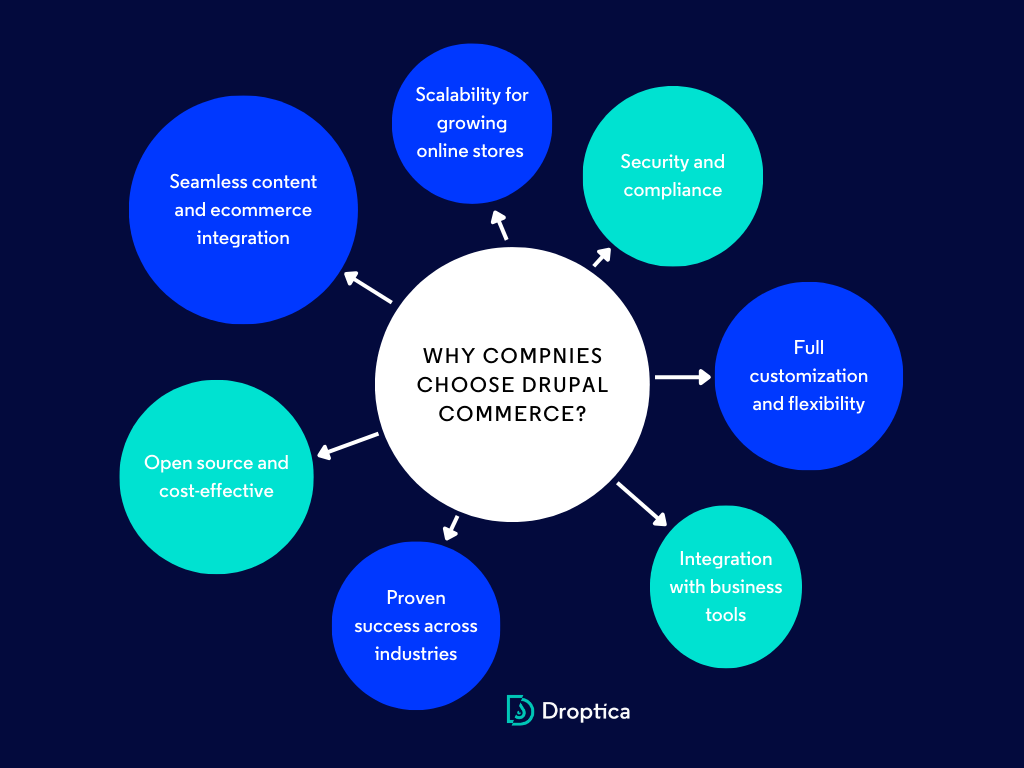
Ecommerce businesses require a robust, scalable, and customizable solution to meet evolving customer needs. Many struggle with rigid platforms, high operational costs, and security concerns, limiting their growth potential. Drupal Commerce provides an open source, flexible, and feature-rich solution that empowers companies to create tailored ecommerce experiences with full control over functionality and scalability.
In this article:
- Introduction to Drupal Commerce
- What are the features of Drupal Commerce?
- Scalability and customization - key features
- Security and compliance - core features
- Why businesses choose Drupal Commerce?
- Drupal for ecommerce - summary
Introduction to Drupal Commerce
Drupal Commerce is an open source software built on the powerful Drupal, providing a seamless way to create and manage online stores with extensive customization capabilities.
Unlike traditional ecommerce platforms that impose rigid structures, this software is designed with adaptability in mind. It allows companies to build tailored shopping experiences with unique product displays, dynamic pricing models, and custom checkout workflows. Whether you're running a small online store or a large enterprise marketplace, the platform offers scalability to adapt to your needs.
One of the key advantages of Drupal Commerce is its deep integration with Drupal’s rich content management features. This makes it ideal for businesses that require both ecommerce functionality and rich content management solutions, such as blogs, customer portals, and membership-based services. Additionally, its modular architecture allows seamless integration with third-party tools, including CRM systems, various payment gateways, and marketing automation platforms.
With multilingual and multi-currency support, advanced SEO capabilities, and strong security features, Drupal Commerce is a powerful choice for companies seeking to establish a robust online presence while maintaining full control over their digital ecosystem.
What are the features of Drupal Commerce?
Drupal Commerce is a highly flexible and modular ecommerce tool designed to meet a wide range of business needs. Built on Drupal, it offers extensive customization options, making it a powerful choice for companies that require more than just a basic online store. Below are the key features that set Drupal Commerce apart.
Flexible product management
Drupal Commerce allows companies to create and manage products with custom attributes, variations, and categories. Online shop owners can define product types, add unique pricing rules, and present items dynamically based on user preferences. The platform also supports:
- Product search and filtering – customers can refine their searches based on categories, price ranges, product attributes, and other criteria.
- Sorting options – products can be sorted by price, popularity, release date, or other custom parameters.

Filtering options in the Develey online store based on Drupal Commerce.
Streamlined checkout and payment processing
A smooth and customizable checkout process is essential for reducing shopping cart abandonment rates. Drupal Commerce provides:
- Flexible checkout workflows – companies can configure single-page or multi-step checkout processes.
- Guest and registered user checkout – customers can complete purchases without account registration or create an account for easier future transactions.
- Multiple payment gateways – integration with popular payment providers such as PayPal, Stripe, Authorize.net, and more (thanks to payment modules for Drupal Commerce).
Advanced tax and pricing rules
Drupal Commerce supports complex pricing strategies and tax rules to accommodate different business models:
- Automated tax calculations – compliant with regional tax regulations, including VAT, GST, and sales tax.
- Dynamic pricing options – discounts, tiered pricing, and promotional pricing rules can be configured based on user roles, product categories, or shopping cart values.
Order and inventory management
Companies need efficient order processing and inventory tracking to ensure smooth operations. Drupal Commerce provides:
- Customizable order workflows – shop owners can set up automated order statuses, invoicing, and fulfillment processes.
- Inventory tracking – stock levels can be updated automatically based on orders and warehouse management integrations.
Multi-language and multi-currency capabilities
For businesses operating internationally, Drupal Commerce provides built-in multilingual and multi-currency support:
- Language adaptability – product descriptions, checkout pages, and customer communication can be translated into multiple languages.
- Multi-currency support – customers can view prices and complete transactions in their local currency, with automatic currency conversion options.
Marketing, promotions, and customer engagement
Drupal Commerce includes various tools to attract and retain customers:
- SEO and performance optimization – built-in features help improve search rankings and page load times.
- Promotions, discounts, and special offers – shop owners can create coupons, seasonal discounts, and customer-specific deals.
- Upselling & cross-selling strategies – personalized product recommendations, bundled offers, loyalty programs, and wishlist functionality to enhance customer satisfaction and retention.

Example of bundled offers on the Develey site developed by Droptica.
User profiles and personalization
Drupal Commerce enables companies to offer personalized shopping experiences through:
- Customizable user accounts – customers can track orders, manage addresses, and save payment methods.
- Wishlist and saved products – users can mark favorite items for later purchases.
- Personalized recommendations – based on browsing history and purchase behavior.
Scalability and customization - key features
One of the key strengths of Drupal Commerce is its ability to scale and adapt to the specific needs of businesses, whether they are small online shops, large enterprises, or B2B marketplaces. Thanks to its modular architecture and deep integration with the Drupal ecosystem, the platform provides virtually unlimited customization options, making it suitable for a wide range of industries and business models.
Modular and extensible architecture
Drupal Commerce is built on a highly flexible system where features can be extended with additional contributed modules or custom-built solutions. This means companies can start with a minimal setup and gradually add functionalities as their needs evolve. Some key aspects include:
- Custom product catalogs – businesses can define unique product attributes, categories, and display formats.
- Adaptable checkout workflows – the checkout process can be customized to match specific customer journeys.
- Flexible pricing models – support for dynamic pricing, subscription-based models, and personalized discounts.
Headless commerce and API-first approach
For companies seeking for modern, decoupled ecommerce solutions, Drupal Commerce supports a headless commerce approach. This means the backend (Drupal Commerce) can be separated from the frontend, allowing for:
- Integration with JavaScript frameworks – frontends can be built using React, Vue.js, Angular, or other modern technologies.
- Multi-channel commerce – the same backend can power ecommerce experiences across websites, mobile apps, kiosks, and even IoT devices.
- Faster page loads and improved UX – a decoupled frontend enhances performance and flexibility in UI design.
Integration with third-party tools and services
To maximize business efficiency, Drupal Commerce seamlessly integrates with various third-party platforms, including:
- Marketing automation platforms – integration with HubSpot, Marketo, or Mailchimp for personalized email campaigns.
- CRM systems – connecting with Salesforce, Zoho, or other customer management solutions to enhance user experience.
- Payment gateways and financial tools – support for PayPal, Stripe, Authorize.net, and regional payment providers.
- Analytics and tracking – Google Analytics, Matomo, or custom tracking setups for data-driven decision-making.
Performance and scalability
Drupal Commerce is designed to handle growing traffic and expanding product catalogs efficiently. Businesses can scale their online stores without worrying about performance bottlenecks by leveraging:
- Caching and content delivery optimizations – integration with Varnish, Redis, and CDN services to improve speed.
- Cloud hosting and containerization – compatible with AWS, Google Cloud, and Docker for scalable infrastructure.
- Load balancing and database optimization – ensuring smooth performance during high-traffic events like sales campaigns.
Custom workflows and business logic
Unlike many rigid ecommerce platforms, Drupal Commerce allows companies to define their own workflows, whether it's in product management, order management, or customer interactions. Custom business logic can be implemented using:
- Rules module – automating actions based on user behavior or order conditions.
- Custom modules and plugins – developers can extend functionalities without modifying core code.
- User role and permission management – allowing different levels of access for admins, sellers, and customers.
With these scalability and customization features, Drupal Commerce provides companies with the tools they need to create unique, high-performance ecommerce experiences tailored to their specific goals. Whether scaling up product offerings, integrating advanced technologies, or building a custom user experience, Drupal Commerce remains a future-proof solution for online retail.
Security and compliance - core features
Security is a critical aspect of any ecommerce website, as businesses must protect customer data, ensure secure transactions, and comply with international regulations. Drupal Commerce is built on Drupal’s robust security framework, providing enterprise-level protection against vulnerabilities, unauthorized access, and cyber threats.
Built-in security features
Drupal Commerce benefits from Drupal’s core security architecture, which is continuously updated and monitored by Drupal Security Team. Some of its key security features include:
- Regular security updates – Drupal has an active security community that releases patches and fixes for potential vulnerabilities.
- Role-based access control (RBAC) – store owners can define user permissions to restrict access to sensitive information and administrative features.
- Data encryption – protection of sensitive customer information, including passwords and payment details.
- Session management – prevention of unauthorized access by automatically logging out inactive users or requiring multi-factor authentication.
Secure payment processing
Handling online transactions securely is a top priority for any ecommerce business. Drupal Commerce ensures payment security by:
- Integrating with PCI-compliant payment gateways – including PayPal, Stripe, Authorize.net, and other providers that handle sensitive financial data securely.
- Tokenized payments – storing payment credentials safely without exposing credit card information.
- Fraud detection and prevention – integration with third-party fraud detection services to reduce chargebacks and unauthorized transactions.
Compliance with data protection regulations
Companies operating in different regions must comply with various legal requirements for data protection. Drupal Commerce is designed to support compliance with:
- GDPR (General Data Protection Regulation) – tools to manage user consent, data access requests, and the right to be forgotten.
- PCI-DSS (Payment Card Industry Data Security Standard) – ensuring secure handling of payment information.
- CCPA (California Consumer Privacy Act) – support for user data control and transparency.
Protection against cyber threats
Ecommerce sites are common targets for cyberattacks, including malware, phishing, and DDoS attacks. Drupal Commerce minimizes risks through:
- Security modules and monitoring – contributed modules like Security Kit, Two-Factor Authentication (TFA), and CAPTCHA enhance protection.
- Firewalls and intrusion detection systems – support for cloud-based security solutions to prevent unauthorized access.
- Automated backups and disaster recovery – ensuring business continuity in case of security breaches or server failures.
With its strong security measures, compliance support, and flexible security configurations, Drupal Commerce provides a safe and reliable environment for online businesses. Store owners can focus on growing their business while ensuring their customers' data and transactions remain protected.
Why businesses choose Drupal Commerce?
Businesses choose Drupal for ecommerce platforms because of its flexibility, scalability, and deep integration with Drupal content management system. Unlike rigid, out-of-the-box e-commerce solutions, Drupal Commerce allows for complete customization, making it an ideal choice for companies with unique requirements, whether they are startups, growing enterprises, or large-scale B2B marketplaces.

Full customization and flexibility
One of the biggest advantages of Drupal Commerce is its ability to be fully customized to fit the specific needs of a business. Store owners can define custom product types, implement complex pricing models, and even create subscription-based offerings. The checkout process is highly adaptable, allowing companies to design a user-friendly experience that aligns with their sales strategy. Additionally, order workflows can be automated and modified based on business logic, ensuring a streamlined fulfillment process.
Seamless content and ecommerce integration
Since Drupal Commerce is deeply integrated with Drupal CMS, it provides a unique advantage for businesses that rely on content marketing. Product catalogs can be combined with blog articles, customer testimonials, and educational materials to create a more engaging ecommerce experience. This integration is particularly useful for companies with membership-based models, digital product sales, or subscription services, where content plays a crucial role in client engagement. Moreover, companies can personalize the customer journey by using content-driven product recommendations and targeted promotions.
Scalability for growing online stores
Drupal Commerce is designed to handle business growth without compromising performance. It supports large product catalogs and can efficiently manage thousands of SKUs. Companies expanding to international markets benefit from built-in multilingual and multi-currency capabilities, ensuring seamless transactions for global customers. Furthermore, Drupal Commerce is compatible with headless commerce architecture, enabling companies to build modern, API-driven shopping experiences using frontend frameworks like React or Vue.js.
Security and compliance
Security is a top priority for any ecommerce platform, and Drupal Commerce provides enterprise-level protection. With regular security updates and proactive monitoring from Drupal Security Team, companies can minimize vulnerabilities. The platform is also built to comply with GDPR, PCI-DSS, and other data protection regulations, helping companies meet legal requirements effortlessly. Secure payment processing is ensured through integrations with trusted payment gateways, reducing risks associated with online transactions.
Open source and cost-effective
As an open source platform, Drupal Commerce eliminates the need for expensive licensing fees, giving businesses full control over their ecommerce infrastructure. Unlike proprietary solutions, it doesn’t lock users into a specific vendor, allowing for greater flexibility in customization and development. The platform benefits from a large and active Drupal Community that continuously improves its features and security. In the long run, the cost-effectiveness of Drupal Commerce makes it a practical choice for companies that want a scalable, high-performing ecommerce solution without excessive overhead costs.
Integration with business tools
Drupal Commerce seamlessly integrates with a variety of third-party services to enhance business operations. It connects with popular CRM and ERP systems such as Salesforce and HubSpot, enabling businesses to manage customer relationships and internal processes more efficiently. Marketing automation tools (such as Mautic) can be integrated to execute personalized email campaigns, retargeting strategies, and customer segmentation. Additionally, real-time analytics and reporting tools provide valuable insights, helping companies make data-driven decisions to drive sales and customer engagement.
Proven success across industries
Drupal Commerce has been successfully implemented across a wide range of industries. In the retail and fashion sector, businesses use it to manage extensive product catalogs while offering personalized shopping experiences. For B2B ecommerce, it enables custom pricing, bulk ordering, and customer-specific product catalogs. Nonprofits and educational institutions leverage the platform for selling digital products, online courses, and membership subscriptions. Its flexibility allows it to be adapted to various business models, proving its value across different sectors.
The WAM publishing house online store is based on Drupal Commerce.
Drupal for ecommerce - summary
Drupal Commerce stands out as a powerful and flexible ecommerce solution, offering businesses complete control over their online stores. Unlike rigid, one-size-fits-all platforms, it provides deep customization, scalability, and seamless integration with Drupal’s content management system. Whether a business requires a simple storefront, a large-scale marketplace, or a complex subscription-based model, this solution for ecommerce can be tailored to meet specific needs.
With its robust security features, compliance with global data protection regulations, and the ability to integrate with third-party tools like CRM, marketing automation, and analytics platforms, Drupal Commerce ensures businesses have a secure and data-driven foundation for growth. Its open source nature makes it a cost-effective option that removes vendor lock-in, allowing businesses to scale and evolve without limitations.
For companies looking to create a unique e-commerce experience that combines content and commerce, supports international expansion and adapts to changing market demands, Drupal Commerce provides the flexibility and power to make it happen. Whether launching a new online store or upgrading an existing platform, businesses can leverage Drupal Commerce services to build a scalable, secure, and feature-rich e-commerce solution tailored to their long-term success.











